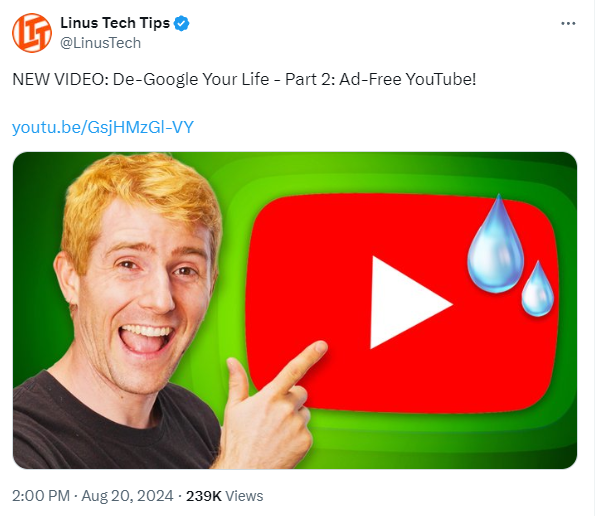https://files.catbox.moe/a6111d.png / https://nitter.poast.org/LinusTech/status/1825956050685800834

If you go the video, https://www.youtube.com/watch?v=GsjHMzGl-VY. You will see it’s gone. So Youtube being Youtube.
Here’s a Odysee mirror of the video, https://odysee.com/@jopec:7/linus-tech-tips-degoogle-your-life-part-2-adfree-youtube:0.


There’s no external program, it’s just an extension on my browser, which uses APIs within the browser to instruct it which content to load and which not to load. I tell it to block all kinds of things, from malware to large media elements to ads. YouTube doesn’t get to decide what content it displays in my browser, I do, because it’s my computer.
Yes, I’m preventing channels from getting ad-revenue, but that doesn’t make it piracy. What we call “piracy” is more correctly called “copyright infringement.” I’m not violating anyone’s copyright, the video is freely available to load and watch, I’m just choosing to not load and watch the optional extras that get shipped along with the video. I’m violating YouTube’s TOS, but that doesn’t mean I’m violating copyright in any way, and I don’t even need to login to YouTube to do this either, so it’s not like I formally agreed to anything here.
What the channels want isn’t my concern. If they want to enforce payment, LTT can post the videos to floatplane exclusively, or join up with Nebula.
That’s absolutely not true. Piracy is copyright infringement, and I’m not infringing anyone’s copyright here.
Here are examples of things that would be piracy/copyright infringement:
Each of those violates copyright because I’m sharing the video with people I am not authorized to share it with. Just watching the content and refusing to load the ads doesn’t violate anyone’s copyright, it just violates YouTube’s TOS, which, AFAIK, isn’t legally binding in any way. They can choose to block me from the platform, but not loading optional extras doesn’t violate any copyright.
That’s… external software. But even if it wasn’t, it’s still circumventing the youtube terms of service with software.
You’re breaking the terms of service of youtube by doing this… that makes it piracy…
No, breaking TOS doesn’t make it piracy, those are two completely separate concepts.
The part where the content creator doesn’t get paid and is supposed to according to the rules of the platform is the part where it’s piracy.
It’s really not. Piracy is copyright violation, and an ad blocker doesn’t violate copyright, it just violates the platform’s TOS.
Your definition of piracy is not correct
How so? This is straight from the dictionary:
So which part is incorrect?
You continue defining yet more terms to avoid saying another. You do you, but that’s not how the world works
What am I avoiding? You said my definition of piracy was incorrect. So I provided a commonly used dictionary definition of piracy to show my point.
If you have another definition that is widely used, I’m happy to discuss it. But something isn’t piracy just because someone isn’t getting paid when they expect to be paid, it’s only piracy if you actually meet the definition of piracy.
Okay the dictionary is wrong, do you have a better dictionary?
Your copyright license to download the video content from YouTube is granted to you by the YouTube Terms of Service. By not agreeing to them, you do not get a license to watch the content.
Copyright law may be dumb and over-reaching but that doesn’t mean you get to redefine it to just avoid an icky word.
If that was true, I would have to agree to YouTube’s TOS to watch videos. That’s not required, so there’s no legally binding agreement between me and YouTube since I haven’t actually signed or accepted anything. My understanding is, I’m not bound to something that’s hidden in a link somewhere and never presented to me.
But even if I were legally bound to the TOS, nothing in the TOS says copyright is granted on the condition that I watch ads. This is the closest that I could see:
I don’t think blocking ads counts as “disable… any part of the Service,” it’s just blocking certain web requests. It’s close I guess, but it seems they’re more worried about “hacks” on the service to get access to things you’re not supposed to. For example, accessing adult content w/o making an account would probably count as a violation under this TOS.
You’re really spending a lot of energy calling piracy not piracy.
Would you call it piracy to yank out the ad insert from a free newspaper and throw it into the trash without looking at it? Because that’s the exact analog from the non-digital world. Just because the mode of payment changes with the technical abilities of the medium doesn’t change that.
If you show me how that’s physically possible I will concede your point, but until then: No, that’s not nearly the same. You can’t just selectively block physical ads.
While the comparison may make sense when not thinking it through, print is a completely different medium than digital where comparisons only make limited sense. In this one they don’t at all.
Physical media does not track views (directly) or click through numbers, for example.
No because the content creator got paid for the ad.
Of course it does, the part where the content creator doesn’t get paid and is supposed to according to the rules of the platform is the part where it’s piracy.
Honestly you’re just showing your complete lack of knowledge on the topic. Using your logic, downloading a pirated movie and watching it myself, then immediately deleting it, is not copyright infringement.
Despite the fact that it literally is.
Not according to German, French, and I suspect most of other european countries laws. Only torrenting copyright-protected content is against the law because you’re uploading the content (distributing) while downloading.
I can torrent without seeding btw
deleted by creator
That… isn’t at all what is being talked about here.